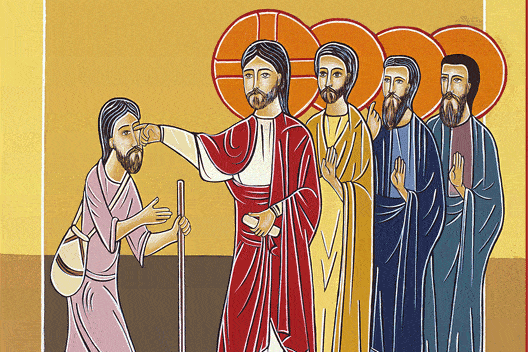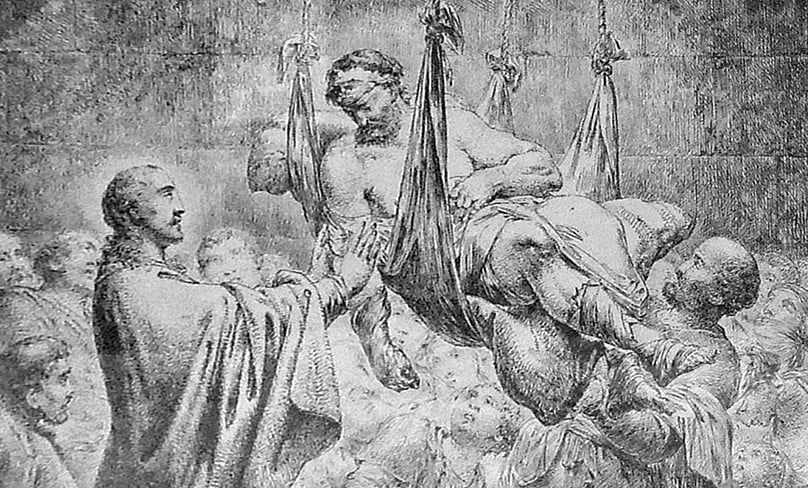
By Jacinta Semaan and Joseph Boulos
In the poetic Syriac tradition, Jesus Christ is called the “divine physician.” St Ephrem the Syrian wrote, “Inside I am not what I appear to be; Heal me.”
Through his incarnation, Christ descended to earth and healed countless individuals of their illnesses—the paralysed, the lame, the leprous, and the blind.
However, the healing that St Ephrem prays for extends deeper than physical ailments – it is a spiritual healing.
Throughout Great Lent, the Maronite Church meditates each Sunday on Christ’s power to heal both body and soul.
This Sunday, the healing of Bartimaeus, the blind man, is a reminder that Lent is a time of healing and continual repentance.
In St Mark’s account of this miracle, rather than uttering, “Jesus, Son of David, heal me; I am blind”, Bartimaeus cried, “Jesus, Son of David, have mercy on me!” (Mk 10:47).
“Christ calls each one of us to arise from our own spiritual blindness, throw aside the cloak of our sinful habits and follow him into the light of his resurrection.”
When Christ calls him, the blind man, “throwing his cloak aside” (10:50), approaches the divine physician who asks what he desires.
Requesting to receive his sight, Bartimaeus is healed and follows the Lord on the way.
This cry for mercy from Bartimaeus demonstrates that the Lord wishes for us to understand His mission.
Christ calls each one of us to arise from our own spiritual blindness, throw aside the cloak of our sinful habits and follow him into the light of his resurrection.
Like Bartimaeus, we are called to be healed by the divine physician, and to follow him.
We are thus encouraged by Saint Paul to walk by faith and not by sight (2 Cor 5:7), fixed upon the truth conveyed by God’s Word.
This is reiterated in 2 Cor 4:18, “We look not at what can be seen but at what cannot be seen, for what can be seen is temporary, but what cannot be seen is eternal.”

The repercussion of sole reliance on what we are able to physically visualise is doubt, and “if deliberately cultivated, doubt can lead to spiritual blindness” (CCC 2088).
How can this doubt be mitigated? In the case of Bartimaeus, along with St Paul, who was blinded on the road to Damascus, conversion comes from within. We too must be aware of our poverty and brokenness.
It is vital to remember that even Jesus’ disciples doubted. Thomas refused to believe without physical sight and touch.
Nevertheless, Thomas’ doubt fulfilled God’s providential plan. When he felt Christ’s wounds, he became a witness to the reality of the Resurrection.
He paved the way for us to open our eyes and make the same choice to believe in God and walk by faith. Only by doing so, are we able to seek the deep connection with God that our hearts long for.
Although, we are not encouraged to believe blindly. The conviction lies within patterns in our daily lives – all individuals believe in something that is not visceral, yet still real.
John accounts that we should believe because the disciples witnessed Christ rise from the dead, they engaged in conversation with him, and they touched him. Our belief is therefore derived from a response to this evidence (CCC, 156).
“It is an extension of an unwavering and relentless pursuit of unbroken communion with our Lord and friend.”
The veil between God and man was lifted when Jesus died upon the cross, inviting us to see. This invitation is alluded to when urged to “lead a life worthy of the calling to which you have been called” (Eph 4:1).
Through this we acknowledge that worship of Christ is not circumscribed as a catalyst to action, yet rather, a daily invitation.
It is an extension of an unwavering and relentless pursuit of unbroken communion with our Lord and friend. Jesus embodied a unifying love for the marginalised and called them to walk with Him.
We must humbly come to recognise that on our greatest days we are like Bartimaeus the blind, the beggar on the mat, or the paralysed man, deeply in need of Jesus’ touch and empowerment.
Let us then walk with Christ, just as Bartimaeus did when Jesus extended his mercy, and accept his fellowship.
Jacinta Semaan is coordinator of UniMaronite and Joseph Boulos is its spiritual coordinator.
